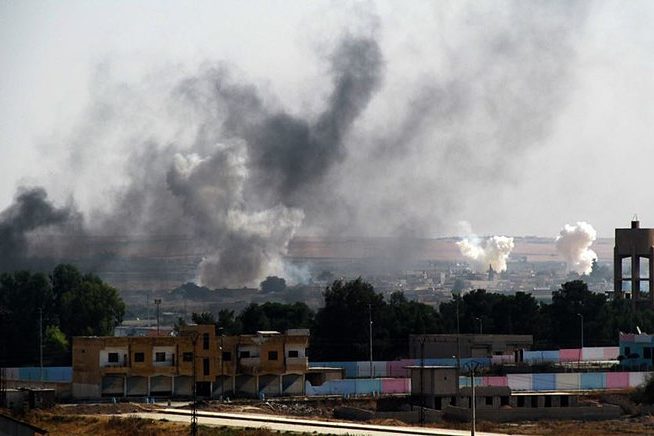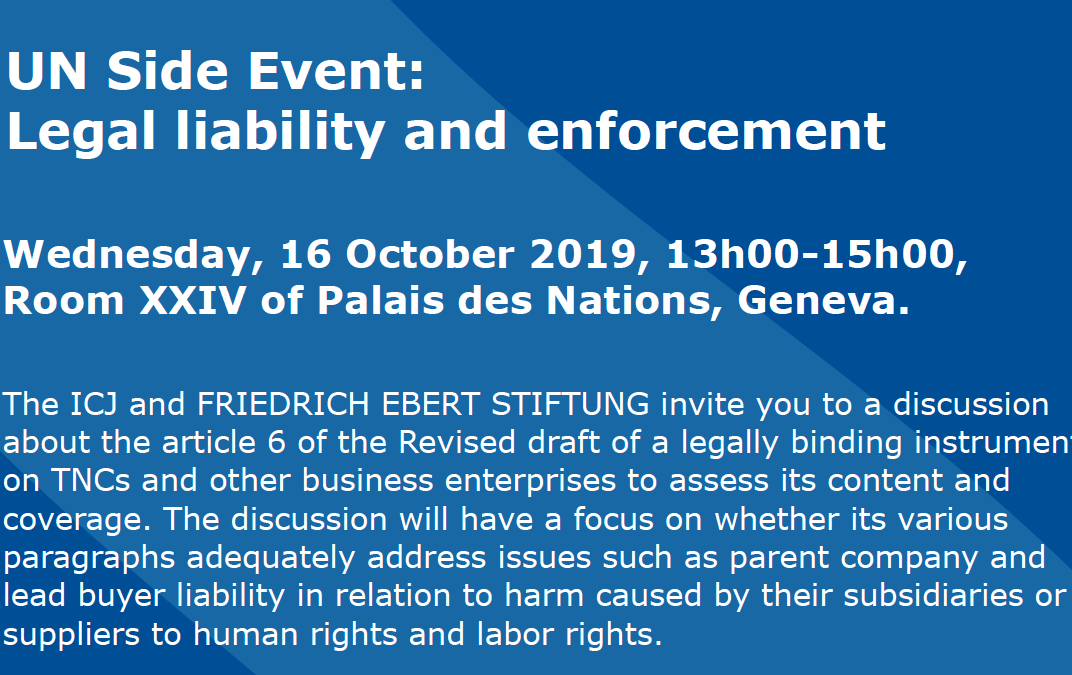
Oct 15, 2019 | News
Today, ICJ called on Turkey to comply with its obligations under the UN Charter, international humanitarian law and international human rights law, immediately end its military operations in Syria, and protect and ensure the protection of the Syrian civilian population.
The ICJ also reiterated its call on all parties to the Syrian conflict to respect and comply with international humanitarian law and international human rights law.
On October 9, Turkey initiated operation “Peace Spring” in Rojava, the Kurdish-led Syrian Democratic Forces (SDF)-held territory in north-east Syria, with the stated aim of securing Turkey’s border, “fighting terrorism” and facilitating the return of refugees to Syria. Turkey claimed to be acting pursuant to its right to self-defence under article 51 of the UN Charter, as well as UN Security Council resolutions on the fight against terrorism.
The ICJ recalled that none of these UN Security Council resolutions authorizes the use of armed force in violation of international law, and that the UN Charter prohibits the use of armed force by States, save when authorized by the UN Security Council or in self-defence.
Use of force in self-defence is lawful only when necessary to repel an armed attack and when proportionate to such attack. Military operations failing to abide by such requirements are in breach of the UN Charter.
“Turkey’s military operations violate the UN Charter and exemplify how the banalization of the illegal use of armed force continues to erode and dismantle the very fabric of the international legal order,” said Said Benarbia, the ICJ MENA Programme Director.
He added, “Instead of standing by while international law is being violated, the UN Security Council must take swift, appropriate measures to address the situation and to restore and maintain international peace and security.”
While UN Security Council member States have failed to find an agreement on even a statement on Turkey’s military operations in Syria, Turkish military operations continue to have a devastating impact on the general population, including multiple civilian casualties, attacks against civilian objects, including medical facilities and water supplies and infrastructure, and the displacement of more than 150,000 people, mainly civilians.
Turkish forces and the Turkish-backed armed groups have allegedly been responsible for violations of international humanitarian law and international human rights law. Members of one of these groups, the Ahrar Al-Sharqiya, have been accused of the extrajudicial execution of at least nine civilians, among whom is Kurdish politician and women’s rights activist Harvin Khalaf; torture and other ill-treatment; kidnapping; and looting and seizure of private property.
Turkey’s Defence Ministry said 595 “terrorists” were “neutralized” since the start of “Peace Spring.”
Under international humanitarian law, parties to an armed conflict must respect and protect the civilian population, and refrain from any direct, indiscriminate or disproportionate attack against civilians and civilian objects. International human rights law also continues to apply during the conflict.
“Turkish authorities must investigate and prosecute unlawful killings committed in the context of operation “Peace Spring,” including extrajudicial executions amounting to war crimes,” Benarbia said.
He added, “If no action is taken by these authorities, States must act, collectively and individually, to hold to account all those responsible for such crimes.”
Contact
Said Benarbia, Director of the ICJ Middle East and North Africa Programme, t: +41-22-979-3817; e: said.benarbia(a)icj.org
Syria-Turkey operations-News-Press releases-2019-ARA (Arabic version, in PDF)
Syria-Turkey operations-News-Press releases-2019-TUR (Turkish version, in PDF)

Oct 14, 2019 | Communiqués de presse, Multimédia, Nouvelles
La condamnation ce jour de dirigeants séparatistes catalans du chef de sédition restreint de façon indue le droit aux libertés d’expression, de réunion pacifique et d’association, déclare la CIJ.
« Ces condamnations représentent une atteinte grave à l’exercice des libertés d’expression, de réunion pacifique et d’association des dirigeants politiques. Le recours à la loi sur la sédition dans le but de restreindre l’exercice de ces droits n’était ni nécessaire, ni proportionné et, partant, injustifiable, » a déclaré Massimo Frigo, Conseiller juridique principal pour le programme Europe et Asie Centrale de la CIJ.
La CIJ souligne également le fait que la définition excessivement étendue du crime de sédition appliquée dans le cas présent crée un risque élevé d’arbitraire.
« Nous sommes inquiets de constater que la Cour Suprême ne respecte pas les obligations internationales de l’Espagne en matière des droits de l’homme dans l’examen des accusations visant les prévenus, ce qui affaiblit fortement les condamnations en découlant, » a-t-il ajouté.
Neuf des douze leaders politiques jugés – parmi lesquels des membres haut placés du gouvernement catalan – ont été déclarés coupables de sédition en lien avec leur participation à l’organisation, le 1er octobre 2017, du référendum sur la question de l’indépendance de la Catalogne. Le référendum fut conduit bien que la Cour Constitutionnelle ait prononcé son illégalité.
Le processus de vote référendaire a été interrompu de force à de multiples endroits par la police, laquelle aurait, selon plusieurs signalements sérieux, recouru de façon excessive à la force en violation des obligations internationales incombant à l’Espagne.
« L’ingérence dans l’expression pacifique de volontés politiques ou de manifestations est inacceptable, sauf dans de rares circonstances où elle s’avère strictement nécessaire et proportionnée pour des motifs impérieux tels que la sécurité nationale,» a précisé Massimo Frigo.
Contact
Massimo Frigo, Conseiller juridique principal, Programme Europe et Asie Centrale de la CIJ, t : + 41 22 979 38 05 ; e : massimo.frigo(a)icj.org
Contexte
Les 12 individus condamnés en lien avec le référendum d’octobre 2017 incluent Oriol Junqueras (photo), ancien vice-président catalan; Carme Forcadell, ancienne parlementaire catalane; huit ancient ministres du gouvernement catalan – Jordi Turull, Raül Romeva, Joaquim Forn, Santi Vila, Meritxel Borràs, Dolors Bassa, Josep Rull, Carles Mundó –; Jordi Sànchez, l’ancien dirigeant de l’Assemblée Nationale Catalane (ANC); et Jordi Cuixart, ancien dirigeant de l’organisation indépendantiste Òmnium Cultural.
L’Espagne a pour obligation de garantir la liberté d’expression, y compris l’expression politique, telle que protégée par l’article 10 de la Convention Européenne des droits de l’Homme (CEDH) et l’article 19 du Pacte international relatif aux droits civils et politiques de l’ONU (Pacte I) ; et la liberté de réunion pacifique et d’association protégée par l’article 11 CEDH et les articles 21 et 22 du Pacte I.
Le Comité des Droits de l’Homme de l’ONU, dans son Commentaire Général relatif à la liberté d’expression a déclaré : « les Etats parties doivent prendre les plus grandes précautions pour que toute législation relative à la trahison et toutes dispositions analogues relatives à la sécurité nationale, qu’elles se présentent sous la forme de lois sur les secrets d’État, de lois sur la sédition ou sous d’autres formes, soient conçues et appliquées d’une façon qui garantisse la compatibilité avec les conditions strictes énoncées au paragraphe 3 » de l’article 19 du Pacte I, lequel prévoit que les restrictions à la liberté d’expression doivent être fixées par la loi et nécessaires à la sauvegarde de la sécurité nationale ou de l’ordre public. Le droit de prendre part à la vie publique est protégé par l’article 25 du Pacte I.

Oct 14, 2019 | Multimedia items, News, Video clips
The conviction today of Catalan separatist leaders of broadly defined offences of sedition unduly restricts rights of freedom of expression, assembly and association, the ICJ said today.
“These convictions represent a serious interference with the exercise of freedom of expression, association and assembly of the leaders. The resort to the law of sedition to restrict the exercise of these rights is unnecessary, disproportionate and ultimately unjustifiable” said Massimo Frigo, ICJ Europe and Central Asia Senior Legal Adviser.
The ICJ also stressed that the overly broad definition of the crime of sedition applied in this case creates a high risk of arbitrariness.
“We are concerned that the Supreme Court does not comply with Spain’s obligations under international human rights law in the consideration of the charges against these defendants and this seriously undermines these convictions,” he added.
Nine of the twelve leaders on trial – including high-ranking Catalan government officials –were convicted of sedition in connection with their part in the administration on 1 October 2017 of a referendum on Catalonian independence. The referendum was conducted despite having been declared illegal by the Constitutional Court.
The voting process during the referendum was forcibly suppressed in many locations by the police, with credible reports of the use of unnecessary and disproportionate force in breach of Spain’s international law obligations.
“Interference with peaceful political expression and protest is not acceptable, save in limited circumstances where it is strictly necessary and proportionate for compelling purposes such as national security .” Frigo said.
Contact
Massimo Frigo, Senior Legal Adviser, ICJ Europe Programme, t: +41 22 979 38 05 ; e: massimo.frigo(a)icj.org
Background
The 12 people convicted in connection with the October 2017 referendum include Oriol Junqueras (13 years of imprisonment for sedition and abuse of power), former Catalan vice-president; Carme Forcadell, former Catalan parliament speaker (11 years and six months of imprisonment for sedition); eight former ministers in the Catalan government – Jordi Turull (12 years of imprisonment for sedition and abuse of power), Raül Romeva (12 years of imprisonment for sedition and abuse of power), Joaquim Forn (10 years and six months of imprisonment for sedition), Santiago Vila (10 months for disobedience), Meritxel Borràs (10 months for disobedience), Dolors Bassa (12 years of imprisonment for sedition and abuse of power), Josep Rull (10 years and six months of imprisonment for sedition), Carles Mundó (10 months for disobedience); Jordi Sànchez (9 years of imprisonment for sedition) the former leader of the Catalan National Assembly (ANC); and Jordi Cuixart (9 years of imprisonment for sedition), former head of the independence organisation Òmnium Cultural.
Spain has obligations to protect freedom of expression, including political expression, under Article 10 of the European Convention on Human Rights (ECHR) and Article 19 of the International Covenant on Civil and Political Rights (ICCPR); and freedom of peaceful assembly and association under Article 11 ECHR and Article 21 and 22 ICCPR.
The Human Rights Committee in its General Comment on freedom of expression has affirmed that: “extreme care must be taken by States parties to ensure that treason laws and similar provisions relating to national security, whether described as official secrets or sedition laws or otherwise, are crafted and applied in a manner that conforms to the strict requirements of paragraph 3” of article 19 ICCPR, which requires that restrictions on freedom of expression be provided for by law and must be necessary for a legitimate purpose, such as national security or public order .) Rights to participate in public life are protected under Article 25 ICCPR.

Oct 14, 2019 | Comunicados de prensa, Multimedia, Noticias
La condena impuesta hoy a los líderes independentistas catalanes por una amplia definición del delito de sedición restringe excesivamente e ilegalmente los derechos de libertad de expresión, asamblea y asociación, dijo hoy la CIJ.
“Estas condenas representan una grave interferencia con el ejercicio de la libertad de expresión, asociación y asamblea de los líderes catalanes. El recurso a la ley de sedición para restringir el ejercicio de estos derechos es innecesaria, desproporcionada e injustificable” dijo Massimo Frigo, asesor legal senior para la CIJ en Europa y Asia Central.
La CIJ también puntualizó que la excesivamente amplia definición del delito de sedición aplicada en este caso crea un alto riesgo de arbitrariedad.
“Nos preocupa que el Tribunal Supremo no haya tenido totalmente en cuenta las obligaciones de España bajo el derecho internacional de los derechos humanos en su consideración de los cargos contra estos acusados lo cual mina seriamente sus condenas” añadió.
Nueve de los doce líderes politicos procesados – incluyendo altos cargos del gobierno catalán – han sido condenados por sedición en conexión con su contribución a la administración el 1 de octubre de 2017 de un referéndum sobre la independencia de Cataluña. El referéndum se llevó acabo pese haber sido declarado ilegal por el Tribunal Constitucional.
El proceso de voto durante el referéndum fue reprimido por la fuerza en muchas localidades por la policía, con informes creíbles de uso innecesario y desproporcionado de la fuerza en violación de las obligaciones de España en derecho internacional.
“La intereferencia con la expresión y protesta política pacífica es inacceptable, salvo en limitadas circunstancias en las que sea estrictamente necesario y proporcionado por razones convincentes como la seguridad nacional.” dijo Frigo.
Contacto
Massimo Frigo, asesor legal senior, Programa Europeo de la CIJ, t: +41 22 979 38 05 ; e:massimo.frigo(a)icj.org
Antecedentes
Las doce personas que han sido condenadas en conexión con el referéndum de Octubre de 2017 incluyen a Oriol Junqueras, ex-vicepresidente de la Generalitat catalana; Carme Forcadell, ex-presidenta del Parlament catalán; ocho ex-consejeros del Gobierno catalán – Jordi Turull, Raül Romeva, Joaquim Forn, Santi Vila, Meritxel Borràs, Dolors Bassa, Josep Rull, Carles Mundó -; Jordi Sànchez, ex-líder de la Asamblea Nacional Catalana (ANC), y Jordi Cuixart, ex-líder de la organización independentista Òmnium Cultural.
España tiene obligación de proteger la libertad de expresión, incluyendo la expresión política, bajo el artículo 10 de la Convención Europea de Derechos Humanos (ECHR, por sus siglas en inglés) y el artículo 19 del Pacto Internacional de Derechos Civiles y Políticos (ICCPR, por sus siglas en inglés), y la libertad de asamblea y asociación pacíficas bajo el artículo 11 de ECHR y los artículos 21 y 22 de ICCPR.
El Comentario General sobre libertad de expresión del Comité de Derechos Humanos afirma que Los Estados partes deben procurar con el mayor cuidado que las leyes sobre traición y las disposiciones similares que se refieren a la seguridad nacional, tanto si se califican de leyes sobre secretos de Estado o sobre sedición, o de otra manera, estén redactadas y se apliquen de conformidad con las condiciones estrictas del párrafo 3 del artículo 19 del ICCPR, lo cual requiere que las restricciones en la libertad de expresión estén legisladas y que sean necesarias en base a propósito legítimo, como la seguridad nacional o el orden público. El derecho a participar en la vida pública está protegido bajo el artículo 25 de ICCPR.

Oct 14, 2019 | Events, News
This side event will take place on Wednesday, 16 October 2019 at 13h00-15h00 in room XXIV of Palais des Nations, Geneva.
The ICJ and FRIEDRICH EBERT STIFTUNG invite you to a discussion about the article 6 of the Revised draft of a legally binding instrument on TNCs and other business enterprises to assess its content and coverage. The discussion will have a focus on whether its various paragraphs adequately address issues such as parent company and lead buyer liability in relation to harm caused by their subsidiaries or suppliers to human rights and labor rights.
The panel will feature:
- Doug Cassel (by video), University of Notre Dame
- Makbule Sahan, International Trade Union Confederation
- Markus Krajewski, Friedrich-Alexander-Universität Erlangen-Nürnberg
- Olivier de schutter, University of Louvain
Moderator
- Ian Seiderman, ICJ Legal and Policy Director
Side event Legal liability (flyer of the event, in PDF)








